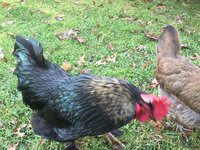Old Philosopher
Songster
NEED HELP! IS THIS FROSTBITE OR FOWLPOX???? PICTURES!
hello everyone! i am so excited i found this forum! so here it goes! i have 4 roosters, and all of them started having these black spots on their combs and wattles, so after reading over 1000 posts on frostbite and fowlpox, i'm not any closer to finding an answer. My roos live inside for this harsh winter , every night is below freezing and way too much snow outside, so their coop in insulated and have 3 heat lamps, it extends to other coops and those have windows for sun and has fans for ventilation, so they are happy otherwise, their roosting poles allow them to cover their feet, so not sure if its frostbite or fowlpox. Yesterday i built a little infirmary in my basement for them so i can keep it warm and make sure no one picks at them while they heal, i wasn't able to post PICTURES of them here on BYC, BUT PLEASE visit my site and go under 'PHOTO GALLERY' TO SEE THEM!!
IF ANYONE could please take a look for me, need some help, very new to the chicken world! but loving every minute of it, i dont want to loose any one of them because i didn't give them proper medications. THANKS!!!!
WWW.CHIMBICA.WEEBLY.COM
I realize this is an old post, but the OP says they have 4 roosters, and have been coop-bound during harsh weather. The black spots are most likely from fighting among themselves, especially under crowded conditions,. I had two roosters, one was the son of the dominant male. They started fighting and both look like they'd been hit with a shotgun! The black spots were dried blood. I found a home for the young one, and the older rooster healed up just fine in a couple months with no treatment.
So my real reason for being in this thread is that my Australorpe rooster got frostbite for the first time this year (he's 4+ years old). We have had a string of mild winters, but this one got down to -22F for a few nights, and with 30" of snow in their yard, the birds were kept in. Combination of temp and humidity, from what I've read here. Also, it seems no action was the right action at this point. The tips of his comb have blackened. I'm going to just keep an eye on him and make sure there is no obvious sign of infection, and wait for the tips to fall off...unless someone has a better idea.
BTW, my Avatar is a picture of him, so you can see why I'm bummed about that comb being damaged!
Last edited:




